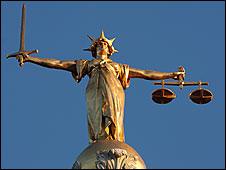Rape charge anonymity pledge dropped
- Published

Critics said the anonymity plan would lead to fewer convictions
Plans to change the law to grant anonymity to men charged with rape in England and Wales have apparently been dropped by the Ministry of Justice.
The ministry said it had not ruled out anonymity between arrest and charge.
But Justice Minister Crispin Blunt has said he would rather put pressure on the media not to name suspects than bring in a new law.
Labour welcomed the apparent U-turn but said the government's handling of the issue had been "lamentable".
The plan to grant anonymity to rape suspects was a surprise inclusion in the government's coalition agreement in May.
It had not been in the Conservative or Liberal Democrat election manifestos, although it had been Lib Dem policy since 2006.
The coalition agreement pledged to "extend anonymity in rape cases to defendants", with ministers stressing the need to "protect anyone who may be wrongly accused from harmful stigma".
But Prime Minister David Cameron appeared to bow to pressure from campaigners last month when he said he favoured a "limited extension" to the law to cover the period between arrest and charge.
'Envelope politics'
After it emerged that ministers preferred not to change the law and to put pressure on the media instead, acting Labour leader Harriet Harman attacked its whole approach to the issue.
"It is really lamentable that they could think of something as important as prosecuting rape, that they should just do a proposal on the back of an envelope," she told the Βι¶ΉΤΌΕΔ.
"It is a very serious offence and they should not just dream up a proposal and bring it forward without thinking about it. Rape is too serious for that."
Shadow Βι¶ΉΤΌΕΔ Secretary Alan Johnson, speaking in the Commons, said he welcomed the government's "U-turn" on the issue.
In the House of Commons last week, Mr Blunt said the government wanted to find a "non-statutory solution" to extending anonymity.
"Given that we had 21 criminal justice acts passed over the 13 years of the last administration, I am sure that Labour [MPs] will understand why we are loath to find even more statutes to put on the statute book," he said.
He suggested Press Complaints Commission guidance recommending the media do not identify people before they are charged with rape might be strengthened.
The Ministry of Justice played down Mr Blunt's remarks, insisting it had not entirely ruled out legislation to provide anonymity between arrest and charge and was still carrying out an analysis of evidence and research on the subject.
Press pressure
The results of this were due to be published before the summer recess but will not now appear until the autumn.
A spokesman said: "We want to make sure a thorough assessment of all of the available evidence is produced to inform the debate on this very important issue. It is right that we take the time to get it right, and have therefore decided to publish the report when Parliament returns in September."
The Press Complaints Commission (PCC) said it would be "happy" to discuss the issue with ministers but said "as yet they haven't approached us".
The PCC is in charge of enforcing editorial standards for newspaper journalists but does not draw up its own guidelines - that is done by a committee of editors. The guidelines are set out in the Editor's Code of Practice but they are not legally binding.
'Negative signal'
Campaign group Women Against Rape said they were "glad the government has been forced to back down".
A spokeswoman said: "Why should men accused of rape have special protection not offered to those facing charges of murder, terrorism or child abuse?
"People are no more likely to be falsely accused of rape than of other crimes. Why this attempt to further discredit and discriminate against rape survivors?"
Labour MPs have criticised the proposal to grant anonymity to rape suspects consistently in Parliament, while Conservative MP Louise Bagshawe told The Observer that by "singling out rape in this way, ministers are sending a negative signal about women and those who accuse men of rape".
The anonymity proposal became Lib Dem party policy in 2006 after a number of cases in which celebrities were named in newspapers over allegations of sexual assault, even though in some cases they were not charged and the complainant was found to be malicious.
The 1976 Labour government introduced anonymity for defendants - only for the measure to be repealed 12 years later under the Tories.
A review of the law earlier this year warned there needed to be a proper examination of the wider issues.
There is no anonymity for defendants in Scotland and Northern Ireland.
.
- Published15 June 2010
- Published2 June 2010